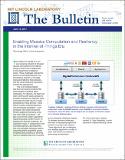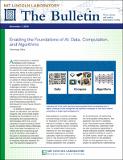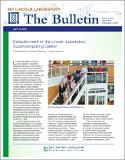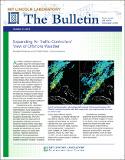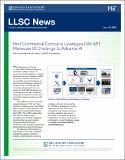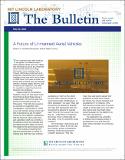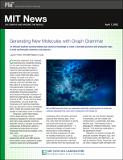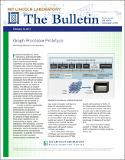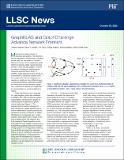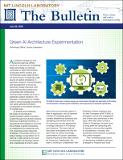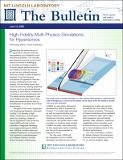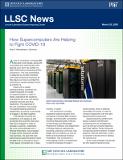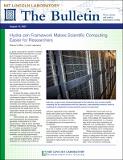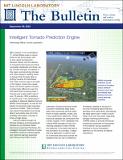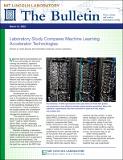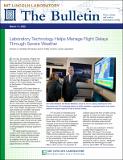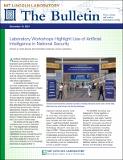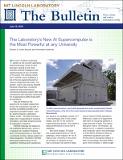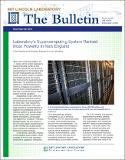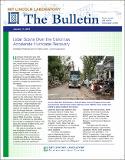Browsing LLSC in the News by Title
Now showing items 21-40 of 83
-
Enabling Massive Computation and Resiliency in the Internet-of-Things Era
(MIT Lincoln Laboratory, 2017-06-16)The Internet of Things (IoT), an ever-growing network of physical devices connected to the Internet, brings a unique set of challenges to the Department of Defense (DoD). These challenges include the billions of connected ... -
Enabling the Foundations of AI: Data, Computation, and Algorithms
(MIT Lincoln Laboratory, 2019-11-01)MIT Lincoln Laboratory staff in the Lincoln Laboratory Supercomputing Center are developing tools to address challenges in data management and algorithmic techniques for novel neural network architectures to enable rapid ... -
Establishment of the Lincoln Laboratory Supercomputing Center
(MIT Lincoln Laboratory, 2016-04-15)Lincoln Laboratory has been a world leader in interactive supercomputing since the 1950s. Recently, the Laboratory acknowledged the importance of the LLGrid world-class computing capability with the establishment of the ... -
Expanding Air Traffic Controllers’ View of Offshore Weather
(MIT Lincoln Laboratory, 2016-10-14)Researchers at the Laboratory, working with the Federal Aviation Administration, have designed the Offshore Precipitation Capability (OPC) to address the lack of airspace situational awareness for aircraft traversing oceanic ... -
First Commercial Company Leverages DAF-MIT Maneuver ID Challenge to Advance AI
(DAF-MIT AI Accelerator, 2023-01-18)The Department of the Air Force-MIT Artificial Intelligence Accelerator (AIA) announced that Crowdbotics is the first company to successfully leverage the Maneuver Identification Challenge to advance the field of AI. The ... -
A Future of Unmanned Aerial Vehicles
(2023-09-28)Though UAVs have continued to be produced, regulations have not been modified since they were first outlined in 2006. Now that these vehicles are being used for tasks such as package delivery, medical supply delivery, and ... -
Generating New Molecules with Graph Grammar
(MIT News, 2022-04-01)An efficient machine-learning method uses chemical knowledge to create a learnable grammar with production rules to build synthesizable monomers and polymers. -
Graph Processor Prototype
(MIT Lincoln Laboratory, 2017-02-10)In order to achieve significantly better graph computation performance, an advanced multiprocessor architecture has been developed that is optimized for analysis of large databases. -
GraphBLAS and GraphChallenge Advance Network Frontiers
(2022-11-09)The challenges associated with graph algorithm scaling led multiple scientists to identify the need for an abstraction layer that would allow algorithm specialists to write high-performance, matrix-based graph algorithms ... -
Green AI Architecture Experimentation
(2022-11-10)The Green AI Architecture Experimentation (GAIA-X) project is developing technologies to promote the concept of green computing by establishing foundational tools and proposing power-reduction strategies. The immediate ... -
High-Fidelity Multi-Physics Simulations for Hypersonics
(MIT Lincoln Laboratory, 2020-06-12) -
How Supercomputers Are Helping to Fight COVID-19
(Gizmodo, 2020-03-23)A host of companies, including IBM, Microsoft, and Google, along with universities and national labs have teamed up to form the COVID-19 High Performance Computing (HPC) Consortium. This new partnership is designed to ... -
Hydra-zen Framework Makes Scientific Computing Easier for Researchers
(2021-09-01)Hydra-zen is a framework that allows researchers to better document and implement their changes to variables and settings used to perform complex experiments and save them alongside the resulting calculations, ensuring ... -
Intelligent Tornado Prediction Engine
(2022-11-09)The most common type of tornado in the Southeast region of the United States, known as a quasi-linear convective system tornado, is historically difficult to warn for, with lead times hovering under 7 minutes and a false ... -
Laboratory Study Compares Machine Learning Accelerator Technologies
(2023-09-28)Dr. Albert Reuther, Senior Staff, Lincoln Laboratory Supercomputing Center (LLSC), is leading a Laboratory study that investigates and compares machine learning accelerators to better understand each accelerator’s strengths ... -
Laboratory Technology Helps Manage Flight Delays Through Severe Weather
(2022-11-10)Historically, air traffic controllers (ATCs) have relied on past experience and looked at weather forecasts themselves to understand and prepare in advance for weather that could impact the flow of traffic. A MIT Lincoln ... -
Laboratory Workshops Highlight Use of Artificial Intelligence in National Security
(2022-04-05)Teams at MIT Lincoln Laboratory are using AI to address national security challenges in collaboration with other organizations. To facilitate this research and promote collaboration with other organizations, the Laboratory ... -
The Laboratory’s New AI Supercomputer is the Most Powerful at any University
(MIT Lincoln Laboratory, 2019-07-19)The new TX-GAIA computing system at the Lincoln Laboratory Supercomputing Center (LLSC) has been ranked as the most powerful artificial intelligence (AI) supercomputer at any university in the world. The ranking comes from ... -
Laboratory’s Supercomputing System Ranked Most Powerful in New England
(MIT Lincoln Laboratory, 2016-12-02)The new computing system, TX-Green, at the Lincoln Laboratory Supercomputing Center (LLSC) has been named the most powerful supercomputer in New England and the 3rd most powerful at a United States university on the TOP500 ... -
Lidar Scans Over the Carolinas Accelerate Hurricane Recovery
(MIT Lincoln Laboratory, 2019-01-11)The Federal Emergency Management Agency (FEMA) called upon MIT Lincoln Laboratory to use its state-of-the-art light detection and ranging (lidar) system to image the destruction from hurricane Florence. A high-resolution ...

